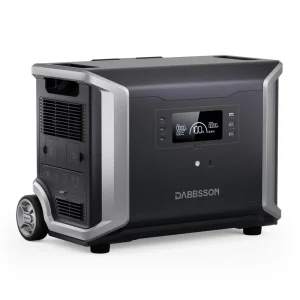Portable generators are well-intentioned ideas for RV purposes, providing a backup power supply not only for short trips and extended off-the-grid forest stays. RVs need these generators to function properly and can handle heavy load appliances as air conditioners, microwaves, and refrigerators especially when parked in a place where there is no electrical hookups. RV appliances can use 1,500-4,000 watts of power based on whether you have a big LCD TV in your huge RV or if everything is turned on all at once. This is a great range for many portable generators, from about 2,000 to 4,000 watts, and they are perfect for RVs as they can provide enough power to run most of the activities youll do in your typical RV.
Portable generators based on inverter technology (like the Dabbsson DBS1000 Pro) are also more fuel-efficient and produce cleaner power, which means that they are perfect for charging sensitive electronics. One of its models, the DBS1000Pro provides 1,000 watts of continuous output power — perfect for an emergency when you need to do high-level cabin tasks like charge your devices and operate small lights or run a 600-watt appliance. The biggest benefit of inverter generators is the efficiency, which come with automatic adjusting engine speed that saves fuel by up to 40% as compared traditional units.
One other huge thing that could never forget are the noise issues. Noise restrictions for generators are prevalent within national parks and campgrounds, usually requiring that they run at less than 60 decibels. The outcome for you is that with portable generators meant for RVs are normally within this category it shows best use in the area where a quiet operating unit will be required. Take the Dabbsson DBS1000Pro, which is noted for a less noisy running experience, but also for outputting all the necessary power.

Safety features are also important with RV portable generators. NEVER EVER run a generator inside or place it under an RV; always run them 20 feet away from the RV and with the exhaust pouring outwards away from the RV because even though you may not smell anything, carbon monoxide buildup can kill — which is invisible. For some vehicles, the U.S. Department of Energy has specifically cited the importance of properly venting portable generators to avoid carbon monoxide poisoning from RVs and other enclosed spaces.
Sixty-five percent of RV owners who camp without electrical hookups use portable generators to fuel their excursions, according to a report by the Recreational Vehicle Industry Association. This speaks volumes to the popularity of generators with RVers as a common necessity for boondocking.
Thomas Edison once said, “Opportunity is missed by most people because it is dressed in overalls and looks like work” RV owners know that if they have a proper generator, following this opportunity to explore far-off locations without leaving the comfort of home is an excellent idea. With the top-notch, fuel-efficient and exceptionally quite generators on the market today deliver a comfortable, safe and sustainable form of RV travel, no matter where that road leads.